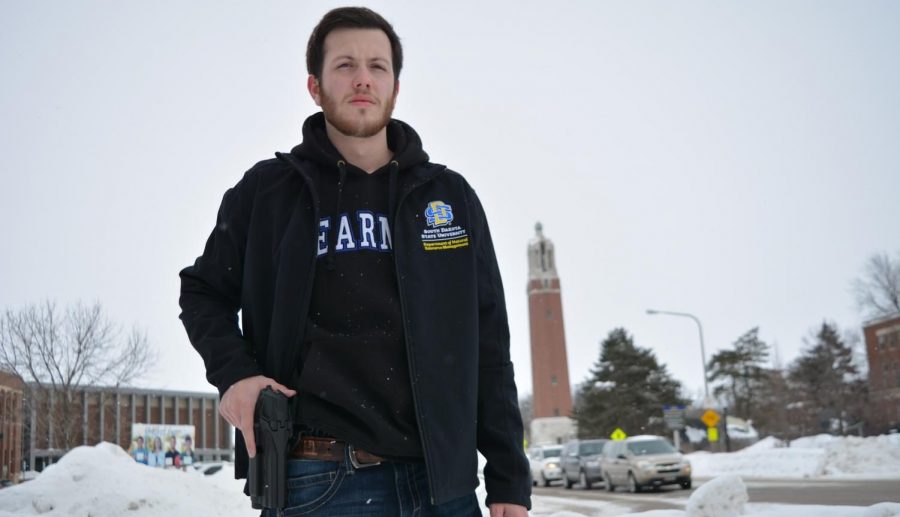Students debate concealed carry on campus
Sophomore Ben Bullinger wants concealed carry for campus. DISCLAIMER: THIS PHOTO WAS TAKEN OUTSIDE THE PERIMETER OF CAMPUS.
February 27, 2019
Thirty-five percent of South Dakota citizens own guns, according to CBS News.
Effective July 1, 2019, South Dakotans will no longer need a permit to carry their concealed weapons, which means they can carry anywhere in the state except in a few particular places. SDSU, and any university campus under the South Dakota Board of Regents is one such place where firearms of any kind are prohibited.
Senate Bill 122 aimed to change that.
SB 122 attempted to “restrict the enactment of policies governing the possession of firearms at public institutions of higher education.” Though it failed 24-10, the bill sparked heated debate both for and against students’ ability to carry a concealed weapon on campus.
Ben Bullinger, a sophomore wildlife and fisheries major, believes concealed carry on campus would help him defend himself if he needed to.
“It could decrease crime more than people want to admit,” he said. “Just knowing that people are carrying on campus is often enough of a deterrent for most people to not go and commit those crimes.”
During the Feb. 19 legislative session, some representatives argued women on campuses would be safer from attackers if they were able to carry a gun, but sophomore sociology and criminal justice major Tory Arbach disagreed.
“I came up from a big gun family but I don’t think that type of force is necessary when there are things like tasers and pepper spray,” she said.
Arbach is a national air-rifle and pistol shooting champion, but she doesn’t think having a gun on campus would make her any safer, and she also expressed concern about the number of men and women who could potentially hurt someone due to lack of training.
Legislatures also referred back to the testimonies they heard from college student governments.
On Feb. 12, Students’ Association Government Affairs Chair Cole McDougall went to Pierre to lobby against SB 122 in accordance with SA resolution 18-09-R, which showed support for the Board of Regents’ ability to make and control policies for its institutions.
Trevor Gunlicks, a senior political science major and state chair of the College Republicans said he was wary of SB 122 because it lacked checks and balances, and the SA resolution was “very valid.”
“That’s why, by and large, we were O.K. with the way it went down,” Gunlicks said. “We weren’t O.K. with the process in which it went down.”
Gunlicks found it “very disturbing” when McDougall stood up and claimed to speak on behalf of the 12,000 students at SDSU.
“I’m sitting there like, ‘Well I’m in direct opposition of you, how can you say you represent all members?’” he said.
Since SB 122 failed in Senate, the Board of Regents’ policy stating that “Possession of firearms or other dangerous weapons on the physical premises of the Regental institutions is prohibited unless authorized by the institutional chief executive officer or designee,” still stands.
Gunlicks said the legislature values student opinions, which is why he felt it was important for organizations like his to have more of a voice.
“Students don’t have the ability to drive to Pierre, we expect our members in SA to do that for us, that’s why they’re elected,” he said. “Are they representing students? Because I’d argue right now on that bill there would’ve been a lot of students here who said ‘We don’t care about your justification, we don’t see it that way, but you voted for it anyhow.’”
Opposing legislation that would allow students to carry a concealed weapon on campus is nothing new for SA.
In 2015, a similar bill went through the legislature and senators discussed some of the detriments unrestricted firearms would have on campuses.
Sen. Nick Lorang said some issues SA brought up were related to NCAA policy because allowing concealed carry on campus would jeopardize SDSU’s ability to host postseason games.
Bullinger disagreed with SA’s justification for opposing SB 122.
“The safety of the students and their well-being and the ones that want to protect themselves and their classmates if they’re given the opportunity is probably, in my opinion, more important than hosting postseason NCAA tournament games,” Bullinger said.




















